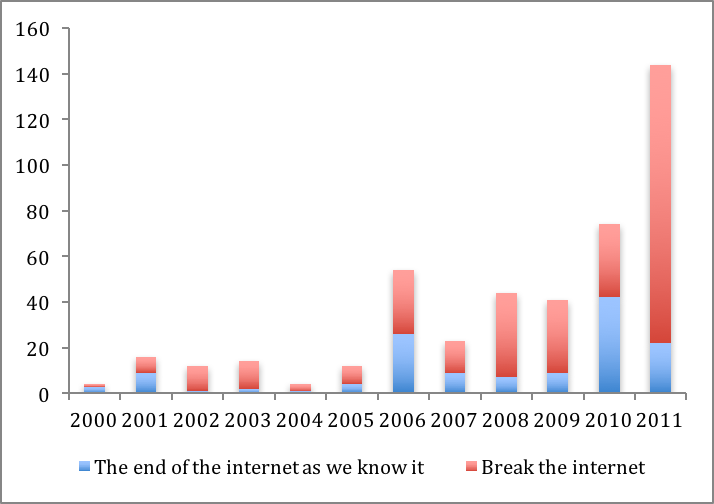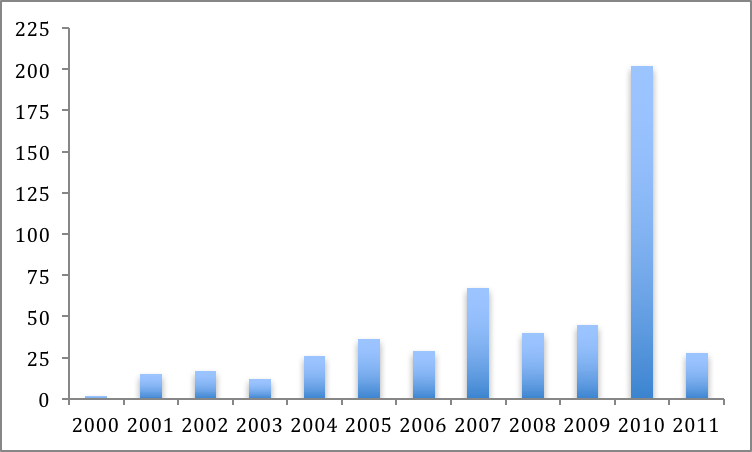Scott Wallsten and Amy Smorodin
From Anthony Wiener’s wiener to the FCC’s brave stand on Americans’ shameful inability to turn down the damn volume by themselves, 2011 has been a big year for tech and communications policy. But how has one of the Washington tech crowd’s most important products—Internet hype—fared this year? In this post, we seek to answer this crucial question.
The Internet Hysteria Index
The Internet is without doubt the most powerful inspiration for hyperbole in the history of mankind. Some extol the Internet’s greatness, like Howard Dean, who called the Internet “the most important tool for re-democratizing the world since Gutenberg invented the printing press.”[1] Others fret about the future, like Canada’s Office of Privacy Commissioner, who claimed, “Nothing in society poses as grave a threat to privacy as the Internet Service Provider.”[2]
 Sometimes the hyperbole is justified. For example, thanks to Twitter, attendees at this past summer’s TPI Aspen Summit were privy to a steady stream of misinformation even before the DC-area earthquake stopped.[3]
Sometimes the hyperbole is justified. For example, thanks to Twitter, attendees at this past summer’s TPI Aspen Summit were privy to a steady stream of misinformation even before the DC-area earthquake stopped.[3]
In the same spirit, we present the Internet Hysteria Index (IHI). The IHI, which the DOJ and FCC should take care not to confuse with the HHI, is the most rigorous and flexible tool ever conceived for gauging the Internet’s “worry zeitgeist”. It’s rigorous[4] because it uses numbers and flexible[5] because you can interpret it in so many different ways that it won’t threaten your preconceived ideas no matter what you believe.
The IHI has two components. The first tracks fears of an unrecognizable, but certainly Terminator-esque, future Internet. We count the number of times the exact phrases “the end of the internet as we know it” and “break the internet” appear in Nexis news searches each year since 2000.
Figure 1: The End of the Internet as we Know It!

Figure 1 shows that 2011 produced a bumper crop of “break the internet” stories, mostly related to the Stop Online Piracy Act and the Protect IP Act. The spike in 2006 reflects a wave of Net Neutrality stories after AT&T’s then-CEO proclaimed that “what they [content providers] would like to do is use my pipes free, and I ain’t going to let them do that because we have spent this capital and we have to have a return on it.”
As our research illustrates, the “End of the Internet” hyperbole shows a healthy, generally upward trend, reflecting the effectiveness of our collective fretting and hand-wringing. Our data do not allow us to identify[6] whether the trend is due to clever Washington PR, lazy hacks retreading old lines, real concerns, or collusion among interest groups simply ensuring they can all stay in business by responding to each other.
The second component of our index measures the incidence of hand-wringing regarding the state of broadband in the U.S. In particular, this measure counts the number of times phrases suggesting lagging U.S. broadband performance show up in Nexis since 2000.[7] Figure 2 shows the results of our analysis.
Figure 2: The Grass is So Much Greener on the Other Side of the Pond: U.S. Broadband Sucks

The big spike in 2010 is related to release of the National Broadband Plan. The prior high, in 2007, saw stories focusing on the OECD rankings, broadband mapping, and the beginnings of broadband plan discussions.
Unfortunately, 2011 was not a good year for misinterpreting shoddily-gathered statistics. Figure 2 shows a dramatic drop-off in bemoaning the dire state of U.S. broadband, possibly after everyone just got really, really tired of talking about the National Broadband Plan. We’re extremely concerned that as a result, the U.S. may have fallen dramatically in the OECD worry rankings. In fact, in a warning shot across our bow, on December 14 the BBC reported that “the UK remains in danger of falling behind when it comes to next-generation mobile services” and superfast broadband.[8] We’re hopeful American fretting will pick up once analysts actually read the FCC’s USF order that was promulgated under the cover of 23 days between approval and publication. On the other hand, there is a risk that the sheer volume of the Order—the equivalent of more than 4 million tweets—might dissuade people from talking about it ever again.
For generations, Americans have taken a back seat to nobody on the important issue of Internet hyperbole. Let’s hope the inside-the-beltway crowd pulls itself together and breathes some life back into the speech economy. Happy New Year.
[1] http://motherjones.com/politics/2007/06/interview-howard-dean-chairman-democratic-national-committee
[2] http://dpi.priv.gc.ca/index.php/essays/the-greatest-threat-to-privacy/
[3] Picture from Funny Potato, http://www.funny-potato.com/blog/august-23rd-2011-east-coast-quake.
[4] It’s not.
[5] In other words, “probably pretty meaningless.”
[6] Actually, they do, but we don’t want to do the work.
[7] Specifically, the search is ((“U.S. falling behind “OR “U.S. lagging”) AND broadband) OR ((“United States falling behind” OR “United States lagging”) AND broadband).
[8] http://www.bbc.co.uk/news/technology-16174745
Scott Wallsten is President and Senior Fellow at the Technology Policy Institute and also a senior fellow at the Georgetown Center for Business and Public Policy. He is an economist with expertise in industrial organization and public policy, and his research focuses on competition, regulation, telecommunications, the economics of digitization, and technology policy. He was the economics director for the FCC's National Broadband Plan and has been a lecturer in Stanford University’s public policy program, director of communications policy studies and senior fellow at the Progress & Freedom Foundation, a senior fellow at the AEI – Brookings Joint Center for Regulatory Studies and a resident scholar at the American Enterprise Institute, an economist at The World Bank, a scholar at the Stanford Institute for Economic Policy Research, and a staff economist at the U.S. President’s Council of Economic Advisers. He holds a PhD in economics from Stanford University.


